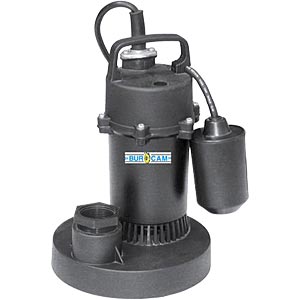Water damage is one the leading causes of property damage to American homes along with termites and mould, blazing ahead (pardon the pun) of household fires in comparison. It does not help that water is a year-round problem that afflicts American homeowners, not merely something to worry about during the rainy season. Moisture seeps in through the soil all the time, undermining household foundations, and during the winter it begins to freeze, causing cracks and fissures in walls. There are ways to prevent this, if the architect of your home was foresighted and willing to put in the extra expense to install a sump pump.
What is a Sump Pump?
A sump pump in its purest form is a device used to pump out water that has collected in specialised sump basins. The water may get in through waterproofing drains installed around the perimeter of the basement, which allows it to flow into the basin, or else through rain and or ground water if the basement is located beneath the water table level. Frequently they are used in places where basements are particularly liable to flooding and to protect from damp, especially in houses where the table water level is above the basement proper.
The water is then directed away from the house to somewhere where it can no longer cause property damage, such as a storm well. It used to be acceptable to pump water into sanitary sewers too, however the practise has since been discontinued by plumbing codes. If you are living in an older property with a sump pump, it may be an idea to check to make sure the water is not being directed towards the sewers.
How do they Work?
Most sump pumps are powered by the household’s electricity supply, where they work to drain collected water away from the house and towards a suitable location. This prevents water damage to the basement and the house’s foundations. Some pumps possess battery-powered backups in the case of a general power failure during intense storms, so that they can continue working even if the house has lost power. Other sump pumps use the home’s pressurised water system to operate as well, which eliminates the need for electricity. However doing so reduces the amount of potable water, is potentially more expensive, and creates additional water disposal problems.
Which one is better is a matter of personal preference, as different sources will give different opinions. However, it is advised for those in storm-prone areas to have a backup pump that runs off the mains. Doing so will help keep your sump basin drained in the case of emergencies, and at least prevent your basement from flooding. Buy one even if storms are irregular, provided you can afford it. They can also kick in if your primary pump breaks down or is being repaired.
How do they Protect my Home?
The most obvious protection that sump pumps offer is that they help keep your basement from flooding. In homes where the basement is below the water table, water damage caused by flooding is a frequent nightmare for homeowners, and having a sump pump installed is the ideal way to prevent it. Even where flooding is not a primary concern, they protect your basement from water by effectively draining built-up ground water as well.
Sump pumps will also protect the concrete in your basement from water damage. During winter, moisture that collects in small pockets of air in concrete can freeze. When water freezes, it expands, and so trapped water will start to break down the concrete in your basement’s walls and floors. After a while, the damage will eventually become so extensive that parts of the basement may become unsafe for use, in addition to letting in more moisture.
Thus pumps, by extension, also promote the health and wellbeing of your household. Water damage leads to damp, which can lead to mold. To prevent respiratory, skin, and other health problems, it is best to prevent mold from occurring where you can.
Further, build-up of water around the house’s foundations can loosen and disturb the soil, making the foundations unstable. After a while, this will cause some sections of the house to sink and incline, which will eventually cause significant damage to your property. This will become progressively more and more expensive to fix, until the house will eventually need to be abandoned. A sump pump will thus keep the soil surrounding the house consistently drained, and promote long-term stability for the structure. This will also save you extensive amounts of cash by no longer having to pay to repair water damage. So think of them as long-term investments.
The writer, Christian Mills, recently bought his own house, and even more recently found himself having to deal with the expense of water damage. He writes about his experiences as a recent home owner, and for preventing water damage in the future he highly recommends Raleigh Waterproofing Incorporated. You can learn more about Christian on Google+.





